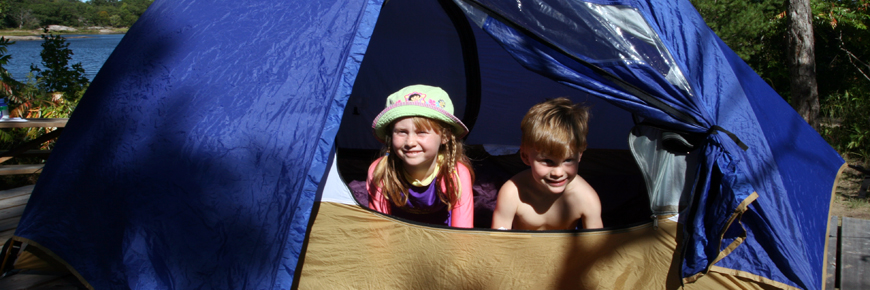
Useful Tips
Georgian Bay Islands National Park

Camping at Cedar Spring Campground
During Your Trip | Food Waste and Related Items
Guide to Camping on Beausoleil Island
Camping on an island is a little different than pulling up to a campground in your car or camper-trailer. Access to our campground is by boat only. The available amenities are not the same as for mainland campgrounds. There are no restaurants, canteens, or grocery stores on the island.
On Beausoleil Island, Cedar Spring Campground offers running water (treated), flush toilets and shower facilities. Electrical outlets are available in the washroom buildings (for hair dryers, charging phones or inflating air mattresses).
During the summer months, firewood and ice can be purchased from the Kiosk. Cellular phone reception is usually very good from most campgrounds on the island.
If camping at a Primitive Campground, running water facilities are not available. Campers bring their own water or personal filtering system. Washroom facilities consist of either a pit privy (outhouse) or composting toilet. Firewood is available for sale seasonally from the maintenance staff who come by to empty the garbage and recycling bins.
All camp sites on Beausoleil Island come equipped with a picnic table and a 'hibachi' or fire box (a fire pit with a fold down grill for campfire cooking).
What to Bring
Your planned length of stay should help determine what you need and what you can't do without.
Keep in mind that space on any boat that is taking you over will be limited.
The Basics:
Tent(s), sleeping bags, matches (waterproof if possible) or lighter, newspaper to start fire, flashlights, suitable clothing and footwear, food and drink (no grocery store on island).
Also...
- Drinking water (if camping at a primitive site)
- Tarp and rope (offers extra protection/shelter from rain)
- Insect repellant
- Sunscreen
- First Aid kit including calamine lotion or Benadryl (for insect bites or poison ivy)
- Coolers and sealed containers (totes with secure lids), tied with rope or bungee cords (there are determined raccoons who share the Island with visitors)
- Sleeping pad (and pillow)...primitive sites have wooden platforms
- Camping stove and/or portable BBQ with fuel
- Lantern
- Dish pan, dishcloth and dish soap (biodegradable)
- Cooking utensils, pots, dishes, forks & knives
Optional...
- Folding or camp chairs
- Beach and swimming toys
- Cell phone
- Camera
- Fishing gear (with license)
- Radio
- Foil paper, cooking spray, oven mitts/pot holders
- Picnic table cover with clamps to hold in place
Pre-Trip Planning
- Try soap-free camping. If soap is necessary, use biodegradable soaps for dishwashing and bathing. Wastewater, even from biodegradable soaps, needs to be filtered through soil for contaminants to break down.
- Reduce garbage by planning meal quantities carefully and packing food in reusable containers. Reduce excess packaging from your gear and food. Avoid glass, cans, twist ties and rubber bands.
- Bring a bug jacket and insect repellent, especially in June and July when biting insects are at their peak.
- Bring at least 50 feet of rope to hang your food in case of bear warnings.
During Your Trip
- Resist the temptation to feed animals, no matter how cute, bold or curious they seem. Handouts may alter feeding habits. Feeding wildlife is illegal in a national park.
- Give wild animals space. Use binoculars and telephoto lenses to observe and photograph wildlife. If an animal begins to flee, acts aggressively or defensively, or approaches you -- you are too close. Avoid disturbing important wildlife areas such as animal dens, bird nests, and noticeable feeding areas.
- Tread carefully when exploring the park. Try to minimize impacts to vegetation, lichens, mosses, and soils by walking on exposed rocks and beaches, and staying on trails.
- Leave all objects and living things where you find them, including plants, rocks, antlers, and cultural artifacts. Some artifacts and locations are sacred to native peoples and should be treated with respect.
- Noise carries and can disturb. Please respect the right of others to privacy and quiet.
Food Waste and Related Items
- Pack out all food waste and containers as much as possible. Garbage left on-site attracts animals and thereby poses a threat to campers.
- Store all food, garbage, dishes, toothpaste, scented products and the clothing you cooked in, away from your tent. When advised of bear in area, put all material in a well-sealed pack and suspend your pack between two trees at a minimum of four metres (13 feet) off the ground and two metres (6 feet) from tree trunks.
- If possible, try cooking downwind from your sleeping area.
- Date modified :